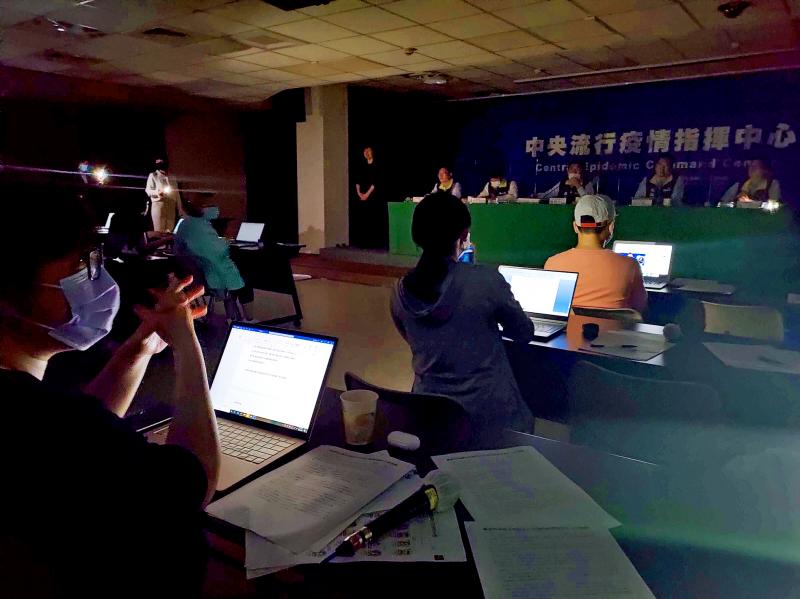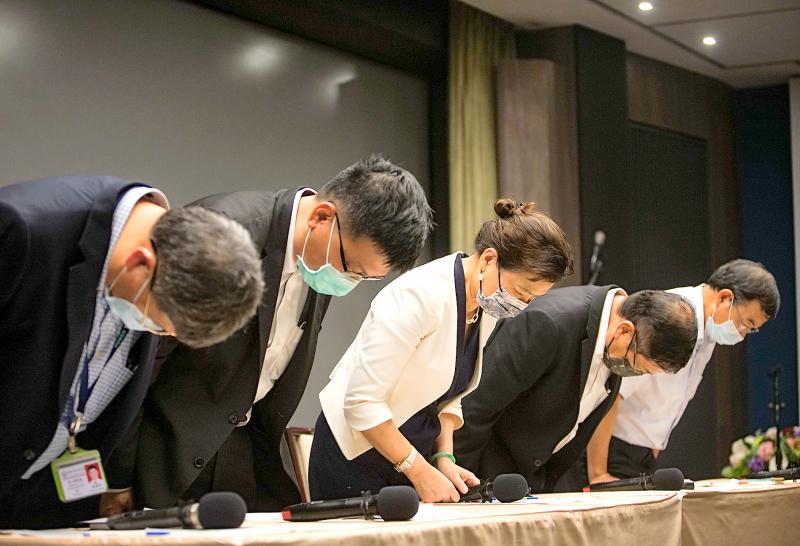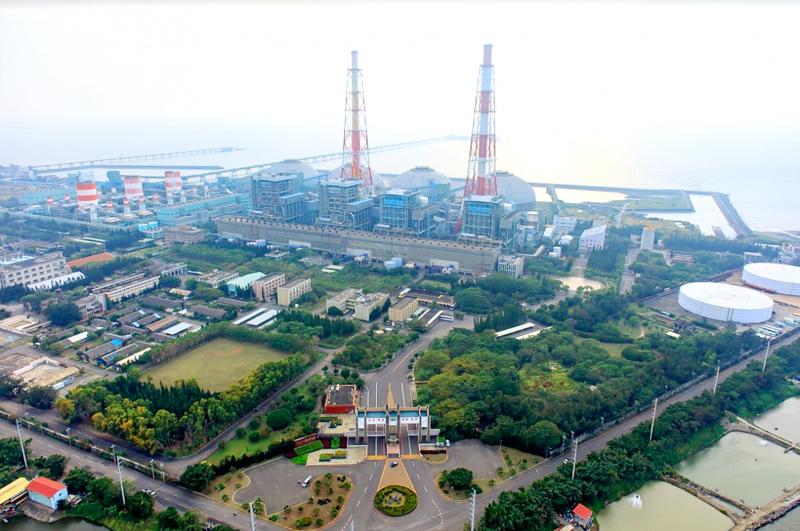There were rolling blackouts across Taiwan yesterday due to a grid malfunction at the Hsinta Power Plant (興達電廠) in Kaohsiung’s Yongan District (永安), while Taiwan Power Co (Taipower, 台電) said that it was working “as hard as possible to resolve the issue as soon as possible.”
At 2:37pm, a malfunction at an ultra-high-voltage substation in Kaohsiung’s Lujhu District (路竹) triggered four generators at the Hsinta plant to go offline, cutting power output by 2.2 million kilowatts and prompting Taipower to initiate rolling blackouts nationwide as it worked on the problem.
Taipower spokesman Chang Ting-shu (張廷抒) told a news conference in Taipei that the blackouts were not due to power usage exceeding supply, but a grid problem.

Photo: Wu Liang-yi, Taipei Times
“Rumors that we ran out of power or something went wrong with the Hsinta plant are false” Chang said. “This is a grid malfunction.”
A bus, or connection feeder, had failed at the Lujhu substation, which caused the voltage to drop precipitously, Chang said.
As emergency controls kicked in, two coal-fired generators and two liquified natural gas generators were shut down at the Hsinta plant, he said.

Photo: CNA
The exact cause of the bus failure remains unknown, Chang said.
The rolling blackouts were implemented at 50-minute intervals, affecting 4 million customers in total, with the goal of having power fully restored sometime yesterday evening, Taipower said.
Later, it said that electricity was restored ahead of schedule at 8pm and no more blackouts were expected.

Photo: Chen Wen-chan, Taipei Times
The first round of outages reduced total output by 3 million kilowatts between 3pm and 3:50pm.
The second round cut output by 3 million kilowatts between 3:50pm and 4:40pm, it said.
The third round reduced output by 3.5 million kilowatts between 4:40pm and 5:30pm; the fourth round was from 5:30pm to 6:20pm; the fifth round was from 6:20pm to 7:10pm, and the sixth was from 7:10pm to 8pm, Taipower said.
Minister of Economic Affairs Wang Mei-hua (王美花) apologized to the nation later yesterday and said that power would be fully restored by 9:40pm.
Idle power generators were brought online in an attempt to fill the gap left by the Singda outages, Chang said.
“We are working to make sure this is resolved overnight,” he said. “Once we fix the grid, we can bring the Singda generators back online.”
The last major power outage in Taiwan, on Aug. 15, 2017, was caused by a natural gas supply disruption at the Datan Power Plant (大潭電廠) in Taoyuan.
It shut down, eliminating 4.7 million kilowatts of power supply.
Half of Taiwan lost power on a rotational basis for at least three hours, affecting many science parks.
Some of Taiwan Semiconductor Manufacturing Co’s (TSMC, 台積電) facilities reported brief power dips yesterday, but the power supply is currently normal, the company said in a statement.
“The electricity is being supplied as normal,” it said. “TSMC has taken emergency response measures and prepared generators to minimize potential impact.”
Operations at ASE Technology Holding Co (日月光投控), the world’s largest chip packaging and testing services provider, had been affected, the company said in a text message, but the full impact was yet to be determined.
Additional reporting by Lisa Wang

NATIONAL SECURITY THREAT: An official said that Guan Guan’s comments had gone beyond the threshold of free speech, as she advocated for the destruction of the ROC China-born media influencer Guan Guan’s (關關) residency permit has been revoked for repeatedly posting pro-China content that threatens national security, the National Immigration Agency said yesterday. Guan Guan has said many controversial things in her videos posted to Douyin (抖音), including “the red flag will soon be painted all over Taiwan” and “Taiwan is an inseparable part of China,” while expressing hope for expedited “reunification.” The agency received multiple reports alleging that Guan Guan had advocated for armed reunification last year. After investigating, the agency last month issued a notice requiring her to appear and account for her actions. Guan Guan appeared as required,

Japan and the Philippines yesterday signed a defense pact that would allow the tax-free provision of ammunition, fuel, food and other necessities when their forces stage joint training to boost deterrence against China’s growing aggression in the region and to bolster their preparation for natural disasters. Japan has faced increasing political, trade and security tensions with China, which was angered by Japanese Prime Minister Sanae Takaichi’s remark that a Chinese attack on Taiwan would be a survival-threatening situation for Japan, triggering a military response. Japan and the Philippines have also had separate territorial conflicts with Beijing in the East and South China

A strong cold air mass is expected to arrive tonight, bringing a change in weather and a drop in temperature, the Central Weather Administration (CWA) said. The coldest time would be early on Thursday morning, with temperatures in some areas dipping as low as 8°C, it said. Daytime highs yesterday were 22°C to 24°C in northern and eastern Taiwan, and about 25°C to 28°C in the central and southern regions, it said. However, nighttime lows would dip to about 15°C to 16°C in central and northern Taiwan as well as the northeast, and 17°C to 19°C elsewhere, it said. Tropical Storm Nokaen, currently

PAPERS, PLEASE: The gang exploited the high value of the passports, selling them at inflated prices to Chinese buyers, who would treat them as ‘invisibility cloaks’ The Yilan District Court has handed four members of a syndicate prison terms ranging from one year and two months to two years and two months for their involvement in a scheme to purchase Taiwanese passports and resell them abroad at a massive markup. A Chinese human smuggling syndicate purchased Taiwanese passports through local criminal networks, exploiting the passports’ visa-free travel privileges to turn a profit of more than 20 times the original price, the court said. Such criminal organizations enable people to impersonate Taiwanese when entering and exiting Taiwan and other countries, undermining social order and the credibility of the nation’s